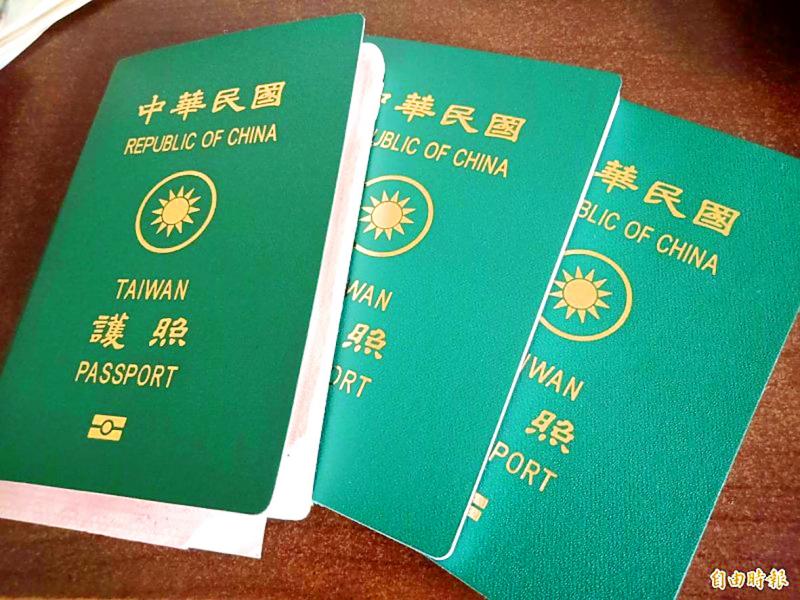More than 70 percent of Taiwanese in a poll have said that the government should remove the nation’s English-language name “Republic of China” from the cover of the nation’s passports and only use “Taiwan” as the nation’s English name so that foreign immigration officials would not mistake Taiwanese travelers for Chinese nationals, a poll showed.
The New Power Party (NPP) released the results of its survey yesterday.
The cover of the nation’s passports bears the name “Republic of China” in English under the nation’s official Chinese name, while “Taiwan” is printed in English under the national emblem.

Photo: Lu Yi-hsuan, Taipei Times
However, 74.3 percent of respondents said that the passport’s cover should use just “Taiwan” as the English title, as the nation and Taiwanese have often been negatively associated with China amid the COVID-19 pandemic.
The change would avoid Taiwanese being confused with Chinese, they said.
According to the poll, 51.2 percent said they were very supportive of the suggestion, 23.1 percent said they supported it, 10.8 percent said they did not support it and 6.4 percent said they absolutely did not support it, while 8.5 percent did not express any opinion.
“People have suggested using stickers or passport holders to distinguish the Taiwanese passport from the Chinese passport. However, stickers might cause confusion. We suggest that the passport cover be redesigned,” NPP Chairman Hsu Yung-ming (徐永明) said.
The party would ask people to submit their ideas for a new passport cover design before the summer vacation, Hsu said, adding that it would work with experts to create samples for the Ministry of Foreign Affairs to consider.
The survey, conducted on Monday and Tuesday last week, collected 1,085 valid questionnaires and has a margin of error of 3 percentage points.
The results were weighted based on gender, age and education, the party said.

ENDEAVOR MANTA: The ship is programmed to automatically return to its designated home port and would self-destruct if seized by another party The Endeavor Manta, Taiwan’s first military-specification uncrewed surface vehicle (USV) tailor-made to operate in the Taiwan Strait in a bid to bolster the nation’s asymmetric combat capabilities made its first appearance at Kaohsiung’s Singda Harbor yesterday. Taking inspiration from Ukraine’s navy, which is using USVs to force Russia’s Black Sea fleet to take shelter within its own ports, CSBC Taiwan (台灣國際造船) established a research and development unit on USVs last year, CSBC chairman Huang Cheng-hung (黃正弘) said. With the exception of the satellite guidance system and the outboard motors — which were purchased from foreign companies that were not affiliated with Chinese-funded

PERMIT REVOKED: The influencer at a news conference said the National Immigration Agency was infringing on human rights and persecuting Chinese spouses Chinese influencer “Yaya in Taiwan” (亞亞在台灣) yesterday evening voluntarily left Taiwan, despite saying yesterday morning that she had “no intention” of leaving after her residence permit was revoked over her comments on Taiwan being “unified” with China by military force. The Ministry of the Interior yesterday had said that it could forcibly deport the influencer at midnight, but was considering taking a more flexible approach and beginning procedures this morning. The influencer, whose given name is Liu Zhenya (劉振亞), departed on a 8:45pm flight from Taipei International Airport (Songshan airport) to Fuzhou, China. Liu held a news conference at the airport at 7pm,

Taiwan was ranked the fourth-safest country in the world with a score of 82.9, trailing only Andorra, the United Arab Emirates and Qatar in Numbeo’s Safety Index by Country report. Taiwan’s score improved by 0.1 points compared with last year’s mid-year report, which had Taiwan fourth with a score of 82.8. However, both scores were lower than in last year’s first review, when Taiwan scored 83.3, and are a long way from when Taiwan was named the second-safest country in the world in 2021, scoring 84.8. Taiwan ranked higher than Singapore in ninth with a score of 77.4 and Japan in 10th with

GRIDLOCK: The National Fire Agency’s Special Search and Rescue team is on standby to travel to the countries to help out with the rescue effort A powerful earthquake rocked Myanmar and neighboring Thailand yesterday, killing at least three people in Bangkok and burying dozens when a high-rise building under construction collapsed. Footage shared on social media from Myanmar’s second-largest city showed widespread destruction, raising fears that many were trapped under the rubble or killed. The magnitude 7.7 earthquake, with an epicenter near Mandalay in Myanmar, struck at midday and was followed by a strong magnitude 6.4 aftershock. The extent of death, injury and destruction — especially in Myanmar, which is embroiled in a civil war and where information is tightly controlled at the best of times —